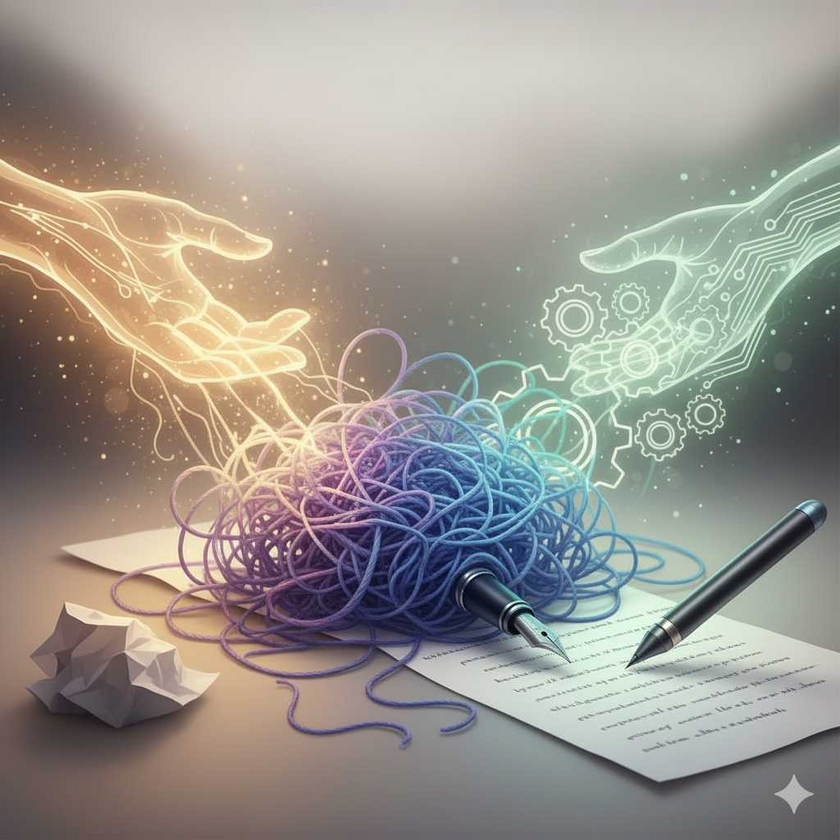Introduction
Have you ever sat in front of a blank page, typing a few words only to delete them moments later? You tell yourself it needs to sound better, be clearer, more creative, or more professional. Minutes turn into hours, and by the end of it, you have half a paragraph and a whole lot of frustration. This is what overthinking does to writers. It disguises itself as perfectionism, but underneath it all, it is fear, fear of judgment, of not being good enough, of not finding the right words.
Overthinking doesn’t discriminate. It affects students writing essays, professionals drafting reports, content creators preparing posts, and anyone who has ever tried to communicate an idea. But here’s the thing, good writing rarely comes from overcontrol. It flows from trust, experimentation, and clarity of purpose. And that is exactly what many people lose when they overthink every word.
In this post, we will explore why overthinking ruins writing, how it creeps into our creative process, and how today’s smart tools are helping writers let go, regain flow, and rediscover their voice.
The Psychology Behind Overthinking in Writing
Writing is as much a psychological act as it is a technical one. When you write, you are not just arranging words; you are exposing thoughts, emotions, and ideas to the world. That vulnerability makes many people overthink.
Overthinking in writing often starts with small habits that seem harmless. You write a sentence, then immediately edit it. You pause to check grammar before finishing the paragraph. You rewrite the introduction three times before reaching the body. Eventually, your brain becomes stuck in a loop of self-correction instead of expression.
The core of overthinking lies in self-doubt. Writers fear being misunderstood or appearing unskilled, so they try to perfect every detail. Yet, paradoxically, this perfectionism kills momentum. The more you analyze, the harder it becomes to simply say what you mean. Each word feels like a risk. Each sentence feels like a test.
Students, for example, often hesitate to start their essays because they fear their first draft won’t sound academic enough. Professionals may avoid sending an email until it is polished to unnatural precision. Even experienced writers fall into this trap, believing that good writing must emerge perfect on the first try. But creativity doesn’t work that way. It thrives on imperfection, exploration, and iteration.
When every word becomes a battle, writing stops being communication and turns into self-interrogation. Overthinking drains joy and confidence, replacing them with anxiety and exhaustion.
How Overediting and Perfectionism Sabotage Creativity
One of the most damaging habits for any writer is editing while writing. Many people believe that constant editing leads to better results, but what it truly does is interrupt creative flow. When you try to perfect every sentence before moving on, your mind switches between two opposing states: creation and correction. The creative brain wants freedom, while the analytical brain wants control. They cannot operate fully at the same time.
Imagine trying to drive a car with one foot on the gas and the other on the brake. That is what perfectionism does to your writing process. You might make progress, but it will always feel jerky and forced. Overediting prevents ideas from forming organically. Instead of capturing your natural rhythm, you end up writing in fragments, chasing an impossible standard of flawlessness.
The emotional toll of this can be immense. You begin to associate writing with stress instead of expression. You reread the same paragraph so many times that you lose perspective on whether it’s even good anymore. You may even give up entirely, deciding that writing simply isn’t your strength.
But perfectionism is not a mark of excellence; it’s a symptom of fear. The pursuit of a perfect sentence often hides the deeper insecurity that your ideas are not worth sharing. Letting go of that fear doesn’t mean lowering your standards, it means recognizing that progress matters more than polish.
This is where the right technology can make a difference. Smart writing tools don’t replace the human voice; they free it from overthinking. They give writers permission to start messy, to experiment, and to trust that clarity will come later.
The Role of Smart Tools in Breaking the Overthinking Cycle
The rise of AI-powered writing assistants has introduced a quiet revolution in how people approach writing. These tools don’t just correct grammar or suggest phrases; they actively support the creative process by reducing the burden of constant decision-making. For chronic overthinkers, that can be transformative.
Writing Freely with an AI Email Writer
The blank page is the greatest enemy of the overthinker. That first sentence feels like a mountain to climb. An AI email writer helps solve this by providing a structured, confident start. Instead of staring at an empty screen, you get a draft to react to. You can tweak it, personalize it, and make it yours, but the hardest part, getting started, is already handled.
This small shift changes the psychology of writing. You are no longer trying to create perfection from nothing; you are collaborating with a digital assistant that gives you something tangible to work with. Many professionals use this approach to handle their daily correspondence more efficiently. Instead of agonizing over tone and phrasing, they can focus on the message and human connection.
When you stop fearing the blank page, you open space for authenticity and clarity.
How a Readability Checker Brings Confidence and Clarity
Even after finishing a draft, overthinkers often spiral into uncertainty. “Is this too wordy? Is it clear enough? Does it sound professional?” This is where a Readability checker becomes invaluable.
A Readability checker objectively evaluates how understandable your writing is. It measures sentence structure, tone, and complexity to ensure your message reaches your audience in the simplest and most effective way. For writers who tend to overanalyze every phrase, this brings peace of mind. You no longer need to guess whether your writing works, you can see it.
This measurable feedback transforms editing from a cycle of self-doubt into a process of improvement. Instead of feeling lost in subjective worry, you gain confidence that your text meets real readability standards. Clarity replaces anxiety, and editing becomes purposeful rather than obsessive.
Using a Paraphrasing Tool to Unlock Flow
Sometimes the problem isn’t getting started; it’s getting unstuck. You have a sentence that feels awkward, but no matter how many times you rewrite it, something feels off. That frustration feeds overthinking and slows down progress.
A Paraphrasing Tool can help break that loop. By rephrasing your content with alternative sentence structures or vocabulary, it sparks new ideas and provides fresh perspectives. It doesn’t replace your creativity, it stimulates it.
Writers often describe this as “creative momentum.” When you see your thoughts expressed differently, you regain confidence and find words flowing again. A good paraphrasing tool turns overthinking into rethinking in a healthy, productive way.
MyEssayWriter.ai The Gentle Coach for Stuck Writers
Among modern AI tools, MyEssayWriter.ai stands out for its balanced approach. It isn’t just a generator of words, it’s more like a coach that understands the natural rhythm of writing. It helps users outline ideas, draft essays, and refine tone while preserving personal style.
For students, it reduces the fear of starting from nothing. For professionals, it ensures their communication remains polished without losing authenticity. What makes myessaywriter.ai particularly valuable is its sensitivity to context. It doesn’t force a robotic tone or uniform structure; instead, it adapts to the writer’s purpose.
Writers who struggle with overthinking often need reassurance as much as assistance. This platform provides both. It offers a safe environment to explore ideas without fear of judgment, empowering people to write more confidently and naturally.
Learning to Trust the Process Again
Letting go of overthinking is not about silencing your inner critic completely, it’s about knowing when to listen and when to move forward. Smart tools can help, but the mindset shift has to come from within.
To rebuild trust in your writing process, start by separating creation and correction. Write first, edit later. Drafts are supposed to be imperfect; that’s how growth happens. Next, use AI tools as supportive partners, not as replacements. Let them handle structure, clarity, or tone adjustments while you focus on meaning and creativity.
Setting boundaries also helps prevent overthinking. Give yourself time limits for writing sessions or number of revisions. Once you hit that limit, stop editing and move on. This trains your mind to value completion over endless refinement.
As you practice these habits, something subtle but powerful happens: you begin to trust your voice again. You realize that your words do not need to be flawless to be meaningful. That trust is the foundation of all great writing.
The Future of Writing Is About Collaboration, Not Control
The conversation around AI and creativity often focuses on replacement, but that misses the deeper truth. Technology isn’t taking away human creativity; it’s giving it room to breathe.
AI writing tools are not meant to take over our imagination. They are meant to handle the parts of writing that drain mental energy so that humans can focus on storytelling, insight, and connection. They don’t erase individuality; they amplify it by reducing the noise of self-doubt.
The future of writing will belong to those who see AI not as a threat, but as a partner. Writers who learn to collaborate with technology will produce work that is both authentic and efficient. They will spend less time trapped in hesitation and more time crafting ideas that move people.
Overthinking has always been the invisible barrier between thought and expression. But the emergence of intelligent tools is helping to lower that barrier. It’s not about control anymore; it’s about collaboration.
Conclusion
Overthinking is the silent killer of creativity. It convinces you that you are improving your work when, in reality, you are paralyzing it. Yet, escaping that cycle doesn’t mean abandoning care or precision. It means trusting yourself enough to let go of fear and perfectionism.
Smart tools like myessaywriter.ai, an AI email writer, a Readability checker, and a Paraphrasing Tool can act as companions in this journey. They give writers structure, feedback, and momentum, the very things overthinking takes away. With their help, you can stop worrying about every comma and start rediscovering the joy of expression.
Good writing isn’t about thinking harder. It’s about thinking freely.
Want to read more? Check out these blogs:
The Struggle of Making Complex Ideas Simple and the Hidden Power of a Readability Checker
Why Paraphrasing Tools Are More Than Just Re writers in 2025
Why Clarity Gets Lost in Our Messages and How Smarter Writing Can Bring It Back














